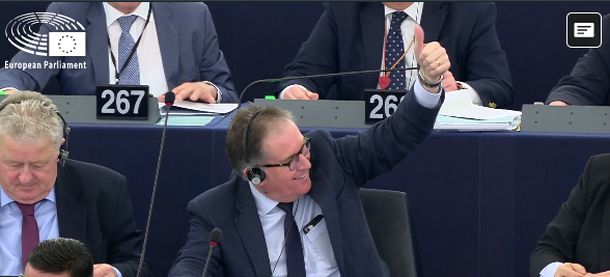The EU has voted to steal fish from the displaced people of Western Sahara, writes columnist John Hilary, 17 May 2006.
17 May 2006
http://www.guardian.co.uk/commentisfree/2006/may/17/stinkingrottenfish
Due east of the Canaries, there is a people for whom sand means something very different from tourist beaches. The people of Western Sahara live in refugee camps in the desert regions of Algeria in some of the harshest conditions on earth. And if the prospect of burning days and freezing nights isn't bad enough, these people have just been betrayed by the EU over a mess of fish.
Western Sahara has been occupied for 30 years by Morocco after the latter signed a secret and illegal deal with the territory's colonial master, Spain, in the final act of the Francoist government. It remains Africa's last colony, seemingly forgotten by the international community, its people divided between refugee camps in the Algerian desert and life under occupation in their own homeland.
Every year the UN reaffirms the right of Western Sahara to self-determination, and it has had a mission there for nearly 15 years to organise a referendum. The 165,000 Saharawi refugees have created a democratic and educated society in exile, laying down their arms, renouncing the use of terrorism and simply asking the international community to help them return to their homeland.
Yet instead of championing this seemingly exemplary resistance movement, the EU has continued to arm the occupier, Morocco, with a view to building ever closer economic and political ties with it.
Which brings us to yesterday's events in Brussels, where the European parliament voted to steal the resources of the Saharawi people from under their very noses. The vote concerned the signing of a fisheries agreement with Morocco. Such agreements are not uncommon: Europe has fished its own waters dry and is now looking to the waters of west Africa in order to make up for our lack of sustainability.
But this agreement has a difference: it fails to specify the southern limit of its operation, thereby allowing Morocco to define the extent of its territory and thus allowing European boats to fish in the very rich but also very occupied territorial waters of Western Sahara: convenient, but illegal under international law.
Yesterday MEPs had the opportunity to introduce an amendment that would have excluded Western Saharan waters and brought the agreement into line with international law. Despite resistance from close to 200 MEPs, pressure from EU member states including Sweden, Finland and Ireland, rebels from both socialist and conservative groups and a campaign coalition drawn from 19 EU countries, the parliament rejected the amendment. At the end of the day the profits of the European fishing industry were simply too important to jeopardise for the sake of international law and 165,000 refugees.
The matter will go to the council of ministers (the EU's supreme decision-making body) on Monday, but no great hope is being placed there. The UK government has already said that it is unlikely to amend the agreement or even to include a statement on the rights of the Saharawi people and the need to end the occupation.
To the refugees, this is just the EU giving Morocco one more reason to flout international law. Just last month, the Moroccan king, Mohamed VI, made a controversial visit to the occupied territories of Western Sahara that sparked demonstrations and mass detentions by the Moroccan security forces. The king made clear that while he supported some degree of autonomy, Morocco would not give up "one inch of soil" in Western Sahara.
Even when a resistance movement has renounced violence and bears no taint of corruption or any other charge, it finds itself abandoned by the international community. Surely Tony Blair and his European colleagues should be rewarding the Saharawi people for their exemplary behaviour, not punishing them in the name of blatant self-interest.
Here is the EU Council's legal advice on fishing in occupied waters
Hans Corell criticizes EU fisheries in Western Sahara
The former Legal Counsel to the UN Security Counsel, Mr. Hans Corell, comments on the EU's fisheries activities in Western Sahara.
EU Court reaffirms position on Western Sahara
Polisario has a case, but it should be pursued when the time is right, Court implies.
European Parliament disregards Court and adopts Morocco fish deal
Notwithstanding four consecutive rulings of the EU's highest Court calling such a practice illegal, the European Parliament has just now voted in favour of the EU-Morocco Fisheries Agreement that will be applied to the waters of occupied Western Sahara.


